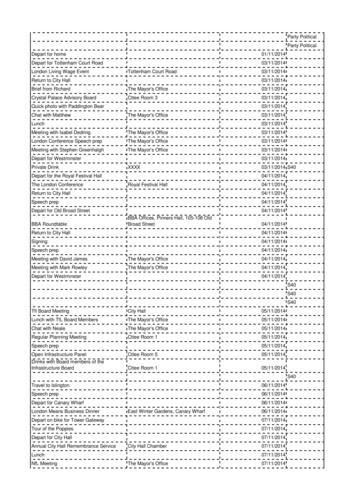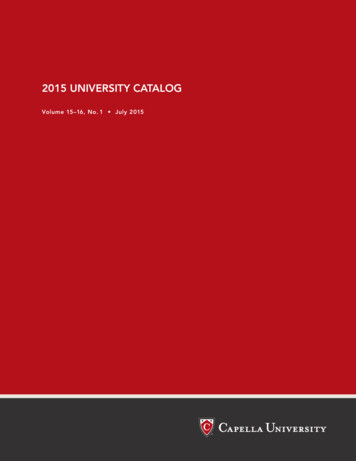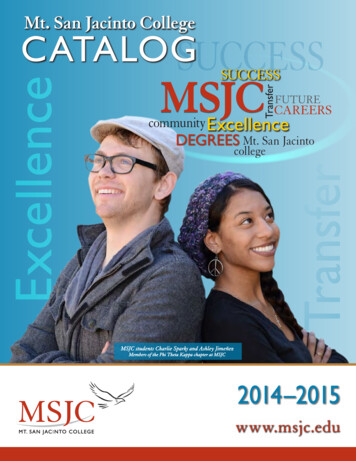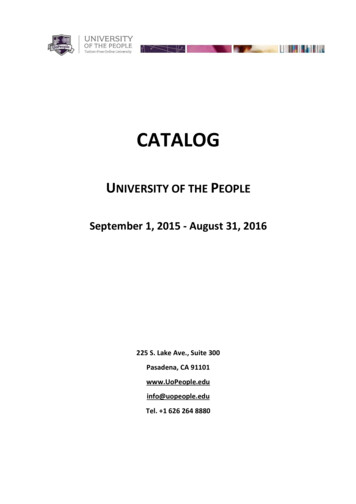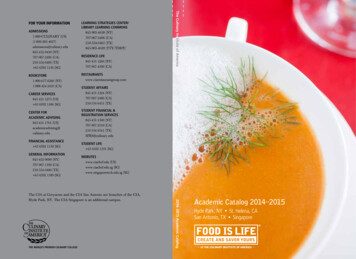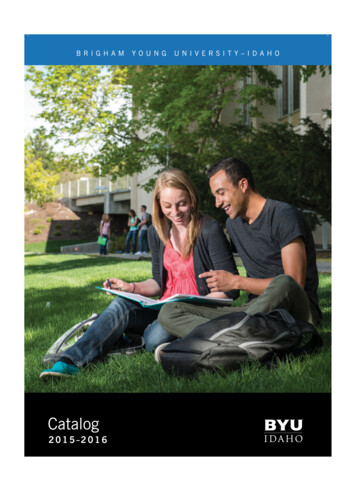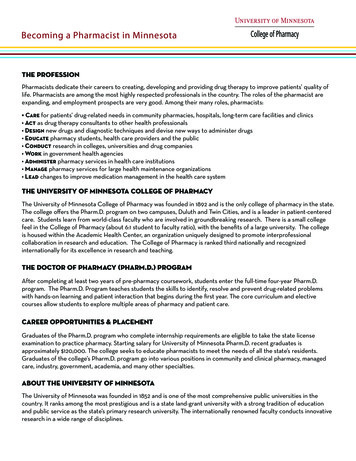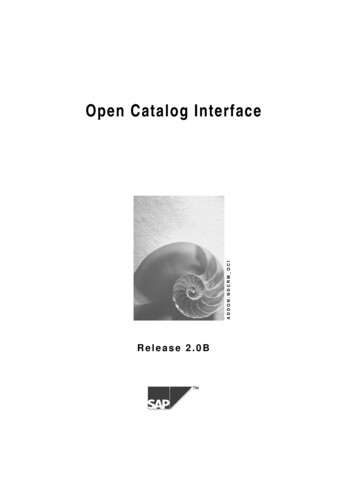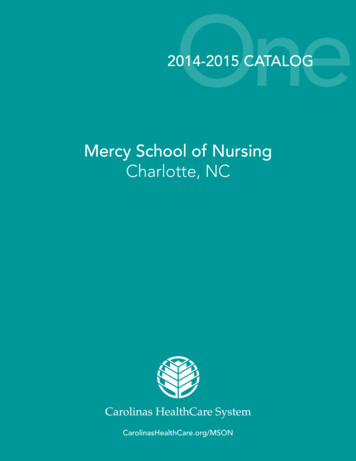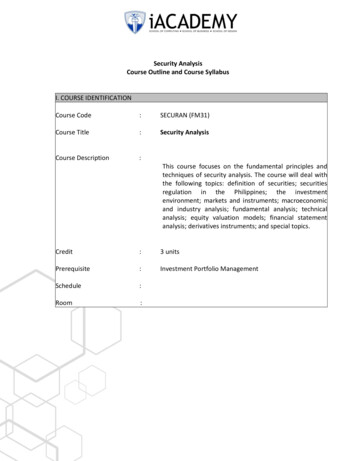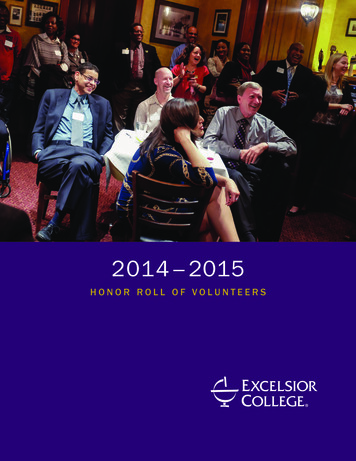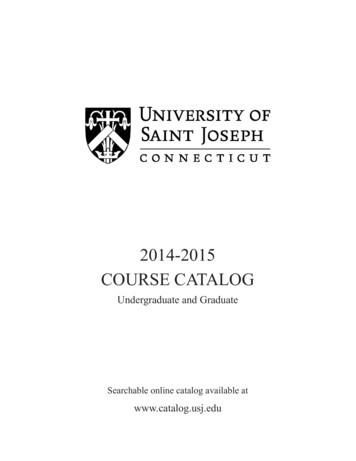
Transcription
2014-2015COURSE CATALOGUndergraduate and GraduateSearchable online catalog available atwww.catalog.usj.edu
TABLE OF CONTENTSAccreditation. 3Statement of Non-Discrimination. 3About the University of Saint Joseph.4Academics.7Academic Programs. 7Organization of the University. 8Other Academic Programs. 8Laboratory Schools. 9Campus Services and Student Life.10Campus Services. 10Student Life. 14NOT ACCURATEAcademic Calendars.15Admissions.16Undergraduate Admission. 16Graduate Admission. 22Veterans and Reservists. 24Tuition and Fee Schedule 2011-2012.24Undergraduate. 24Graduate Tuition. 27Professional Programs Tuition. 27Tuition Payment Options for Undergraduates & Graduates. 28Refund Policy on Tuition & Fees. 29Student Financial Aid.30Undergraduate Student Financial Aid. 30How is Financial Aid Need Determined?. 30Scholarships Review. 30Graduate Student Financial Aid. 31Veterans Benefits: The Yellow Ribbon Program. 31Financial Aid Application Process – Apply Online. 32Policy for Disbursement of Financial Aid Funds. 33Return of Title IV Funds. 33Additional Information. 33Registration.34Undergraduate and Graduate. 34Continuing Education. 38Degree Requirements.38Bachelor’s Degree. 38Second Bachelor’s Degree. 38General Education. 38Writing Portfolio. 41Comprehensive Evaluation. 42Thesis. 42GPA to Graduate. 42Application for a Degree. 42Time to Degree. 42Graduation with Honors. 43Commencement. 43Academic Policies and Procedures.44Advisement. 44Majors and Minors. 44Academic Credit. 441
Grades and Grading. 46Dean’s List. 47Satisfactory Academic Progress. 47Discontinuing Academic. 49Real World Experience. 50Code of Academic Integrity - Undergraduate. 51Code of Academic Integrity - Graduate. 53FERPA (Family Educational Rights and Privacy Act. 51NOT ACCURATESchools, Departments and Programs.58School of Education. 58Education Department. 58Physical Education and Sports Studies Department. 59School of Graduate and Professional Studies. 59Business Administration Department. 60Counseling and Family Therapy Department. 60Human Development and Family Studies Department. 60Social Work and Latino Community Practice Department. 61School of Health and Natural Sciences. 62Biology Department. 62Chemistry Department. 63Mathematics Department. 63Nursing Department. 63Nutrition Department. 63School of Humanities and Social Sciences. 63English Department. 64Fine and Performing Arts Department. 64History and Political Science Department. 64International Studies Program. 64Languages Department. 64Philosophy Department. 65Psychology Department. 65Religious Studies Department. 65School of Pharmacy. 65Interdisciplinary Programs. 65All Programs.66Course Descriptions.139Faculty and Staff.253Index.259DisclaimerEvery effort has been made to assure the accuracy of the information in this publication. Students are advised, however, that such information issubject to change. They should consult the appropriate academic department or administrative offices for current information.The provisions of this publication are subject to change without notice and do not constitute an irrevocable contract between any student or applicantfor admission and the University of Saint Joseph. The University is not responsible for any misrepresentation of its requirements or provisions thatmight arise as a result of errors in the preparation of this publication.The University of Saint Joseph has reserved the right to add, amend, or repeal any of its regulations and rules in whole or in part, at such times as itmay choose. Nor shall this document be construed as an abridgement or limitation of any rights, powers, or privileges of the Board of Trustees.2
University Level AccreditationACCREDITATIONThe University of Saint Joseph is accredited by the New EnglandAssociation of Schools and Colleges Inc., a non-governmental,nationally recognized organization whose affiliated institutionsinclude elementary schools through collegiate institutionsoffering post-graduate instruction.Accreditation of an institution by the New England Associationof Schools and Colleges indicates that it meets or exceeds criteriafor the assessment of institutional quality periodically appliedthrough a peer group review process. An accredited school orcollege is one which has available the necessary resources toachieve its stated purposes through appropriate educationalprograms, is substantially doing so, and gives reasonableevidence that it will continue to do so in the foreseeable future.Institutional integrity is also addressed through accreditation.Accreditation by the New England Association of Schools andColleges is not partial but applies to the institution as a whole.As such, it is not a guarantee of the quality of every course orprogram offered, or the competence of individual graduates.Rather, it provides reasonable assurance about the quality ofopportunities available to students who attend the institution.To learn more about the University’s accreditation by the NewEngland Association of Schools and Colleges, contact theUniversity’s administrative staff, or the individual schools ordepartments. You may also contact the Association:New England Association of Schools and Colleges(NEASC)Commission on Institutions of Higher Education3 Burlington Woods Drive, Suite 100Burlington, MA 01803855.886.3272http://cihe.neasc.orgThe University is also accredited by the Connecticut Office ofFinancial and Academic Affairs for Higher Education.The University is a member of the Association of AmericanColleges and Universities, the American Council on Education,Association of Catholic Colleges and Universities, the NationalAssociation of Independent Colleges and Universities, theAmerican Association of University Women, the Council forAdult and Experiential Learning, and the American Associationof Hispanics in Higher Education.Program Level AccreditationDoctor of Pharmacy: The University of Saint Joseph Schoolof Pharmacy’s Doctor of Pharmacy program is accredited bythe Accreditation Council for Pharmacy Education, 135 LaSalleStreet, Suite 4100, Chicago, IL 60503, 312.664.3375; Fax312.664.4652, website www.acpe-accredit.org.Chemistry: Approved by the American Chemical Society for theprofessional training of chemists.Teaching: Preparation of elementary, secondary and specialeducation teachers approved by the Connecticut State Board ofEducation and the Office for Higher Education.Nursing: Approved by the Connecticut Board of Examiners forNursing. The baccalaureate and master’s programs in nursingare accredited by the Commission on Collegiate NursingEducation, One Dupont Circle, NW, Suite 530, Washington, DC20036, 202.887.6791. The Department of Nursing is pursuingaccreditation by the CCNE for the Doctor of Nursing PracticeProgram and a post-master’s certificate.Marriage and Family Therapy: Master of arts is accredited bythe American Association for Marriage and Family Therapy’sCommission on Accreditation for Marriage and Family TherapyEducation (COAMFTE).Clinical Mental Health Counseling and School Counseling:Master of arts is accredited by the Council for Accreditation ofCounseling and Related Educational Programs. The graduateprogram in School Counseling is also accredited by theConnecticut State Department of Education.Social Work: Baccalaureate program is accredited by the Councilon Social Work Education.Dietetics: Didactic Program in Dietetics and the DieteticInternship Program are granted accreditation status by theAccreditation Council for Education in Nutrition and Dietetics ofthe Academy of Nutrition and Dietetics, 216 West Jackson Blvd.,Chicago, IL 60606-6695, 312.899.5400. ACEND is recognizedby the United States Department of Education as the soleaccrediting agency for nutrition and dietetics educationOther AccreditationSchool for Young Children: Accredited by the NationalAssociation for the Education of Young Children (www.naeyc.org/academy).Gengras Center: Approved through the Connecticut StateDepartment of Education (www.sde.ct.gov).Financial StatementThe University’s audited financial statement is available byrequest in Pope Pius XII Library.Statement of Non-DiscriminationThe University of Saint Joseph prohibits discrimination against any persons on account of their race, color, religious creed, age, sex,gender identity, sexual orientation, transgender status, marital or civil union status, national origin, ancestry, present or past historyof mental disorder, mental retardation, learning disability or physical disability in the administration of its educational policies,admissions policies, scholarship and loan programs, and employment practices.3
ABOUT THE UNIVERSITY OF SAINT JOSEPHMissionThe University of Saint Joseph, founded by the Sisters of Mercyin the Roman Catholic tradition, provides a rigorous liberal artsand professional education for a diverse student population whilemaintaining a strong commitment to developing the potential ofwomen.The University is a community that promotes the growth of thewhole person in a caring environment that encourages strongethical values, integrity, and a sense of responsibility to the needsof society.Core Values of the University of Saint JosephCatholic Identity: The University of Saint Joseph is groundedin its heritage as a Catholic institution, expressing the Catholictradition in an ecumenical and critical manner.Commitment to Women: The University of Saint Josephencourages, inspires, and challenges each woman to developevery aspect of her personhood - intellectual, spiritual, social,emotional, and physical.Compassionate Service: The University of Saint Josephpromotes, supports, and facilitates caring service as an integralpart of all teaching and learning experiences.Academic Excellence: The University of Saint Joseph provides avalue-centered education that prepares students as global citizens,lifelong learners, and informed decision-makers.Respect/Integrity: The University of Saint Joseph demonstratesrespect and reverence for all people and fidelity in personalwitness.Hospitality: The University of Saint Joseph is a welcomingcommunity where its relationships are based on openness,inclusivity, and mutual respect.Multiculturalism/Diversity: The University of Saint Joseph iscommitted to fostering the growth of an inclusive community thatwelcomes differences among community members and benefitsfrom them.History of the Sisters of Mercycontinued to spread throughout the country, establishing schoolsand hospitals.In 1932, the Sisters of Mercy of Connecticut set out on aremarkable journey. Their mission: to establish the first liberalarts college for women in the Hartford area, founded on theprinciples of service and leadership, and determined to developthe potential of women in a complex and evolving world.Guided by a vision of academic excellence, the University hasflourished and is now nationally recognized for its outstandingprograms in education, nursing, human services, the humanitiesand the sciences. Graduates of these programs have proventhemselves vitally important to the people and the economyof our community and continue to serve in significant waysthroughout their lives.University HistoryIn 1925, the Sisters of Mercy of Hartford began preparationsto extend their contribution to education in Connecticut to thecollege and university level. They obtained from the ConnecticutState Legislature a charter granting power to confer degrees and,in 1932, began a junior college for women at Mount Saint JosephAcademy, West Hartford. Within two years, it had formulatedits four-year liberal arts program, acquired its own campus andreceived approval of a change of name to Saint Joseph College.Since that date, it has expanded both its facilities and enrollment,until in 2012, a name change was necessary to encompass theadvanced programs and degrees offered. In 2014, the Universityconferred its first doctoral degrees to graduates of the new Schoolof Pharmacy.History of Campus BuildingsMcDonough Hall (1936)From 1932 to 1950, Sister Mary Rosa McDonough was SaintJoseph College’s first dean. She planned and oversaw theconstruction of the original buildings and is considered to bethe principal force behind the development of the school. TheAdministration and Science Building, as McDonough Hall wasinitially called, continues to contain classrooms and offices. Itwas renamed in Sr. Rosa’s memory in 1969.The roots of the University of Saint Joseph can be traced to theSisters of Mercy, a religious order founded in 1831 by CatherineMcAuley. The Mission of the Sisters of Mercy was to teach andcare for the sick, poor and needy in Ireland. Catherine McAuley’sdevotion to the Sisters of Mercy mission quickly spread toEngland and eventually found its way to the United States.Mercy Hall (1936)The second of the original campus buildings is named in honor ofthe founding Sisters of Mercy. At one time it contained the chapeland all housing for administrators, faculty and students. Today itcontains classrooms, administrative offices such as Admissions,and the Crystal Room, where University events are held.The first Sisters of Mercy arrived in the United States fromIreland in 1843 at the invitation of the bishop of Pittsburgh, Pa.Their energy in ministering to the sick and economically poorattracted many new members. By 1854, sisters had come fromIreland to settle in New York and San Francisco, Calif., andRosary and McAuley Halls (Student Residences, 1955)These first residence halls set the pattern of clustering dormitorieson the west side of campus. Rosary Hall is named for the prayerthat honors the Blessed Virgin Mary; McAuley honors CatherineMcAuley, who founded the Sisters of Mercy.4
Pope Pius XII Library (1960)Rising enrollment required a separate library building by 1960.The facility was named to honor Pope Pius XII, who as PapalSecretary of State visited in 1936. He was especially interested inCatholic education and met with students in Mercy Hall.The University’s gym, pool, fitness center, running track anddance studio are housed in this building. Dr. Maurice O’Connellwas a trustee and husband of Vitaline McGovern, whosefamily name is found on the student union. Dr. O’Connell wasparticularly interested in physical fitness.Assumption Hall (Student Residence, 1962)As more students wanted to live on campus, Assumption Hallwas built. The name was taken from another event in the BlessedVirgin Mary’s life, when she was taken to heaven.The School for Young Children at Beach Park (1999)Even in its early years, the University was interested in providinghigh-quality schooling for children. This also allowed handson training for students who wanted careers in early childhoodeducation. Originally housed in the lower level of Mercy Hall,the School for Young Children moved in 1999 to the formerBeach Park School on Steele Road. The 1926 building, whichis near campus, has been renovated and is used under a 50-yearlease from the Town of West Hartford.Lourdes Hall (1962)Until recently a residence for the Sisters of Mercy, Lourdescontains classrooms and offices. It is named for the French townwhere the Virgin Mary appeared.McGovern Hall (Student Union, 1962)McGovern houses the dining hall, student lounge, bookstoreand student affairs offices. It is named for Patrick McGovern,who emigrated from Ireland at age 14 and spent the next 77years in Hartford. An astute businessman, he eventually earned 30 million, which he generously shared. His niece was wife oftrustee Maurice O’Connell, and it was through this relationshipthat the McGoverns were introduced to and donated to the school.Gengras Center (1965)As advisor and trustee, E. Clayton Gengras had a long associationwith the University. His cousin was chairman of the State HealthDepartment’s Council on Mental Retardation and chaplain of theHoly Innocents Guild, dedicated to the spiritual welfare of thementally disabled. This family connection led to Gengra
Sisters of Mercy, a religious order founded in 1831 by Catherine McAuley. The Mission of the Sisters of Mercy was to teach and care for the sick, poor and needy in Ireland. Catherine McAuley's devotion to the Sisters of Mercy mission quickly spread to England and eventually found its way to the United States.
